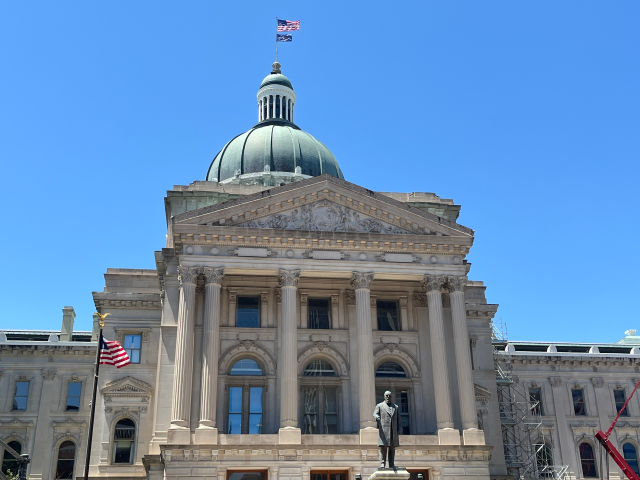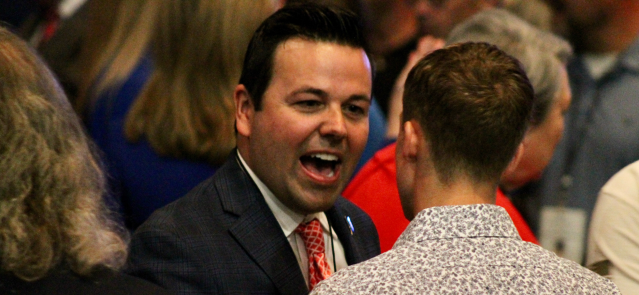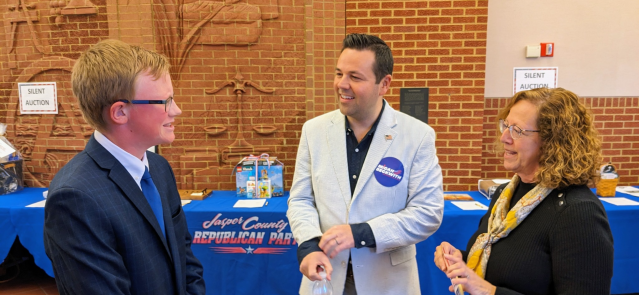Micah Beckwith’s road to victory for the Republican lieutenant governor nomination didn’t begin a year ago as most people believe. The seed was planted four years ago after his failed bid for the 5th Congressional District seat.
“We always battled doubt,” Beckwith told his boss and podcast partner Nathan Peternel on June 21 on their “Jesus, Sex + Politics” podcast. “In the weeks leading up to the convention, I knew we were strong; I knew we had a great shot. But even the day of the convention I felt I was confident, but confidence doesn’t mean this is 100%. I was confident this was in the Lord’s hands.”
On June 15, Beckwith won the nomination by a vote of 891 to 828 at the Indiana GOP State Convention, despite an 11th hour Donald Trump endorsement of Beckwith’s rival, Julie McGuire.
Beckwith’s victorious quest for the Mike Braun ticket began after he came in third place in the 2020 5th Congressional District primary behind self-funders Victoria Spartz and Beth Henderson. He finished with more votes (over 11,000) than state Treasurer Kelly Mitchell, former Marion County prosecutor Carl Brizzi and former Bureau of Motor Vehicles Commissioner Kent Abernathy.
“When I ran for the 5th District, it was hard to get any traction within the spiritual community,” Beckwith said on the podcast. “I thought, ‘That’s not good. This is a stewardship issue. Why aren’t churches and pastors willing to steward the nation that God has given them?’ They are not doing anything to really engage in this.’ ”
Beckwith met Peternel in 2020 at a festival in Atlanta, Indiana, before losing the 5th CD. They bonded over several coffees and lunches.
“We talked about prophecies and our role in the nation,” Peternel said. “I just met someone who could have come out of my mother’s womb. We were so in lockstep. I remember being so excited with joy.”
Beckwith had lost a youth ministry job the month before the 2020 primary. He thought about going back into the family business. But, he explained, “ I said my heart is to bring the gospel into the dark world of politics. The Bible says to go into all the world and preach the gospel. Politics is part of ‘all the world.’”
And so, Peternel decided to hire Beckwith as a pastor at his Life Church Noblesville campus and, believing that the church should be more than a “Sunday morning organization,” decided it was the perfect platform to launch another campaign, this time for lieutenant governor.
Harnessing their faith
Peternel also decided to use Beckwith’s campaign logos in the church announcement.
“That ticked people off,” said Peternel, adding that part of his congregation had been “trending left.”
Part of the congregation revolted and parted.
But in controversy, the pair learned, there is opportunity.
Motivated to confront, in Paternel’s words, “the wickedness of homosexuality and abortion,” he and Beckwith set out to make the case for more faith leaders in the halls of government.
Ministers have always been involved in the American experiment. Beckwith and Peternel noted on their podcast that some 25% of those honored in the National Statuary Hall in the U.S. Capitol are ministers.
“They just added Billy Graham from North Carolina,” Beckwith said, which has John 3:16 and John 14:6 carved in its base.
“This nation is rooted in faith, and if we’re going to continue to be a nation we know, faith leaders must continue to do their job to steward this nation,” Beckwith continued. “That’s the leadership we need more in this country all around — people knowing what is right, having a firm grip on the moral way that God has laid out in front of them, and just go.”
Beckwith and Peternel refer to themselves as Christian nationalists — defined as having “the belief that the American nation is defined by Christianity, and that the government should take active steps to keep it that way,” according to Christianity Today.
“It’s kind of a blind spot in the church where pastors don’t engage in stewarding the nation,” Beckwith said. “They don’t speak about political issues, which really aren’t political issues. They are moral issues, but they’ve turned them into [political themes].”
While part of the congregation left, Beckwith’s exposure on WIBC-FM shows such as “Kendall & Casey” opened up a marketing opportunity for Life Church. A new set of congregants joined.
That fueled the lieutenant governor’s race.
Traditionally, the nominee for governor names a running mate. They seek someone who brings ideological, geographic and gender diversity to the ticket. Most lieutenant governor nominees bring established relationships with the General Assembly, as the lieutenant governor presides over the Indiana Senate and has the ability to break tie votes there. Since the lieutenant governor also serves as head of the Department of Agriculture and Rural Development, preferred lieutenant governors have a farming background or a deep relationship with the agriculture community.
The day after Sen. Braun won the gubernatorial nomination, he announced McGuire, a freshman state representative from Indianapolis, was his choice for running mate. She won an Indiana House seat by defeating state Rep. John Jacob, who was a radical proponent of absolute abortion restrictions. Her campaign received much of its funding from the House Republican Campaign Committee.
Braun did not discourage Beckwith from continuing his unorthodox quest for the ticket, saying repeatedly he loved the “competition.” Beckwith embarked on a rare strategy of seeking the nomination independent of the standard bearer. In 2004, state Sen. David Ford of Hartford City trailed the Mitch Daniels campaign’s RV1 in an effort to make the ticket. Daniels ended up selecting state Sen. Becky Skillman of Bedford.
Giving the people a choice
“A year and a half ago the Lord just planted this seed that we haven’t been utilizing the lieutenant governor’s office correctly,” Beckwith said. “That doesn’t mean we didn’t have good lieutenant governors. We have, but we haven’t utilized them correctly. We haven’t followed the process, and the process is the people have the nominating voice and authority to put someone there.
“So I believe the Lord put that seed in my heart: Get Indiana back in alignment with the authority structure, which is the people own the office of lieutenant governor,” Beckwith said. “Give the people a choice for lieutenant governor. A year and a half ago we started laying the groundwork. Over a year ago we launched the campaign.”
They began recruiting delegates to file for the convention. Beckwith traveled much of the state, meeting with delegates, potential delegates and party leaders.
“We had to convince delegates,” Beckwith said. “We had to help delegates get elected that were going to support me in May. We had to convince the delegates in June to vote for me.”
Braun rallied the GOP hierarchy — House Speaker Todd Huston, Senate President Pro Tem Rodric Bray and Secretary of State Diego Morales — to endorse McGuire.
Two days before the convention came the Big One — Trump endorsed McGuire three hours after Braun talked to him on the phone.
Peternel told Beckwith, “Every endorsement went against you, even two days before, the greatest endorsement in all of politics, Donald Trump. Everything is stacked against you. This will be only God. This is a David and Goliath story. What the officeholders need to know is that God did them a favor.”
Howey Politics Indiana’s analysis heading into the convention was that it was a toss-up race. The speeches from the candidates could determine the winner.
“When I walked up and they made the announcement for me to give my speech … the place erupted,” Beckwith said. “I thought at that moment, man, there was a lot of energy in the room right now, for what we’ve been doing and what the Lord has been doing through us.”
The candidates were given a two-minute time limit. Beckwith approached eight minutes before convention chairman Randy Head (the future state GOP chair) approached him to end his remarks.
“Then my opponent Julie got up and gave a speech that was a lot less energetic,” Beckwith said. “She did a good job. You could just tell you know when you have the hearts of the people. After that speech we heard a lot of people on our opponent’s side say, ‘We like Julie, but when we saw the energy in the room.’”
The new Life Church congregation helped forge 40 delegate votes for Beckwith, Peternel reported. The Rev. Ron Johnson,of Lake County, brought in another 25 delegate votes.
“So that right there. … What did I win by — 65 votes?” Beckwith asked. (It was 63.)
Peternel added, “6% to 7% of all votes were from two churches. It was so much fun watching God.”
When the announcement of the ballot results came in, the name “Micah Beckwith” set off a roar from in front of the stage and the visitors section in the back of the hall.
It was another GOP convention shocker, joining George Witwer’s 1996 lieutenant governor floor fight win, Todd Rokita’s four-way battle for secretary of state in 2002, Greg Zoeller’s 2008 attorney general nomination win, and Diego Morales’ defeat of Secretary of State Holli Sullivan in 2022. In each of those cases, delegates sought to send a message to the “establishment” or the “ivory tower elites,” as Beckwith calls them.
Beckwith did not respond to an interview request for this column.
“My takeaway in all of this is never look down on small beginnings and never underestimate the divine appointments,” Beckwith told Peternel on the podcast. “Every day you’re gonna have divine appointments and you never know where those are going to lead. The Bible says man plans out the path and the Lord directs the steps. This has been a testament of God directing our steps.
“The left woke up on Sunday morning and they were not happy.”
Correction: This story has been updated to accurately identify the names of the state GOP leaders whom Mike Braun rallied to endorse Julie McGuire.
Brian A. Howey is senior writer and columnist for Howey Politics Indiana/State Affairs. Find Howey on Facebook and X @hwypol.





